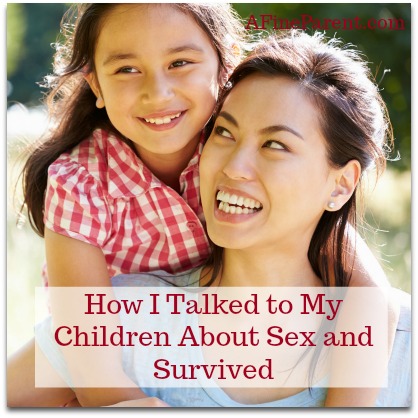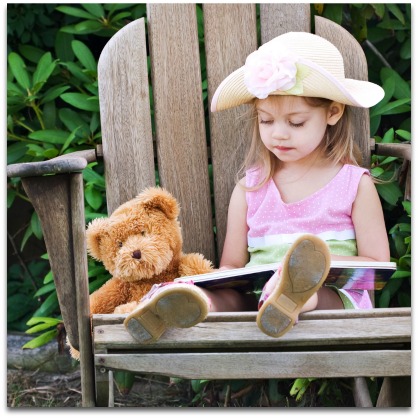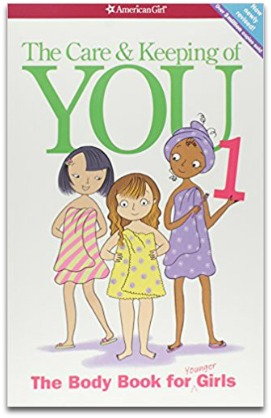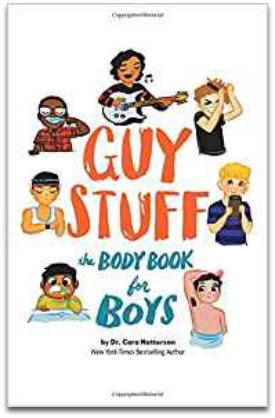 Who taught you about the birds and the bees?
Who taught you about the birds and the bees?
Maybe your parents had an awkward conversation with you or handed you a book to read. Maybe you got bits and pieces of information from your friends. Or maybe you learned from sex education class in school.
Have you thought about when you’ll have the “talk” with your child? And how much information you’ll share at different times?
Will you be proactive to teach your child about sex and puberty?
You may be thinking, my kids are little! This is not something I need to think about yet!
I thought that, too. My four kids are ages 10 and under and I didn’t think much about it. I thought I had years to go.
I was wrong.
Young Girls Are Getting Their Periods
A friend and I were chatting at the bus stop last week. She shared that her 10-year-old just got her first period. Already.
I was speechless. What?! I didn’t even know that could happen that early. After I got over the initial shock, I really got to thinking. What would my own 10-year-old daughter do if she got her period without knowing what a period was?
I thought about the terror my daughter would feel. Having no idea that her period is a completely normal part of life. My little girl mortified and confused. And I thought how guilty I would feel for not preparing her for this stage in her life.
So… I did what any good parent would do: I Googled it. The results were terrifying.
According to a study by Psychology today, 90% of children today first learn about sex from online porn. And the average age of those children is 9 years old.
Say what!?
Ready or not, you need to educate your child on puberty and sex, otherwise they’re going to learn about it in all the wrong ways from all the wrong sources.
How Do You Want Your Child to Learn About Sex?
 I took all my newfound knowledge as a sign to take action. I thought about how I want my kids to learn about sex. And I thought about how I learned about sex.
I took all my newfound knowledge as a sign to take action. I thought about how I want my kids to learn about sex. And I thought about how I learned about sex.
Growing up, my parents rarely talked to us about sex. As a result, (unintended, I know) I grew up feeling sex was a dirty thing. Something that you just didn’t talk about – certainly not nice girls. I think my parents assumed I would learn about sex and puberty in school.
Other parents give their child a book about sex and puberty. There are a few good ones out there, but without a parent to talk with about what they read, children miss out on the real messages in the book. Or kids end up missing the talk altogether because the topic is just too uncomfortable.
Today, children are developing at an alarmingly early stage. We can’t assume our children will magically learn correct information about puberty and sex.
Don’t Let Your Kids Try to Figure Things Out Alone
The sex talk is an uncomfortable conversation to have with your child. No doubt about that. And what makes it awkward? We do. The parents. Based on our own past experiences and preconceived notions.
Most of my anxiety about talking about sex stems from my upbringing.
I grew up in a strict Catholic family. The only conversation we had about sex was not to have it until you’re married. Period. Even then it is only for procreation.
I learned about sex and puberty in sex education class in 8th grade. But I also learned about the Birds and the Bees from friends and popular movies. I ended up putting together bits and pieces as I went.
And knew almost nothing about how to deal with my period. I remember getting my first box of tampons. It waited for me on the bathroom counter. When I got home my Mom showed me the tampon box, handed me the instructions, and walked out of the bathroom. That’s it.
It’s a miracle I figured it out what to do with them. I wish my Mom had helped me. I wish she had been there to offer guidance and answer my questions.
Is that the way I want my child to learn about sex and puberty? No!
I had to think about what guidance I was going to offer my child. Sure, they’ll get the basics from sex ed class, but will it be in time? And will it be what I want them taught?
If you are the first to teach them you can instill your values. You can make sure they get the facts about what is happening to their bodies and minds.
I’m sure you have your own unique story about how sex was or was not talked about in your home. It probably still has a direct effect on how you view sex today.
I am bound and determined to do things differently with my kids. I will prepare my kids for the changes they will experience with their bodies. I will talk openly to my kids about sex. I will answer all their questions.
I want my kids to celebrate the beauty of sex and their bodies. To responsibly enjoy the pleasure sex brings when the time comes. To understand the deep connection and love that goes with it. All without remorse or guilt.
Hopefully that will be when they’re well into their 20’s! A Mom can dream right?
Whatever your feelings or views are on sex. Look past your feelings and discomfort to what is best for your child. Build a relationship of trust that will help you both find your way through the jungle of puberty.
Create a Relationship of Trust and Communication
Having an open conversation with your child about puberty and sex is important.
When you’re confident and truthful – your child picks up on it. Even if you’re nervous, be transparent. Tell your child this is an uncomfortable conversation for you and why. Tell your child you don’t want them to feel the same way.
Be open about why you feel uncomfortable talking about sex and how you learned as an adult that it’s healthy to talk about sex. And you’re going to teach your child a new and improved perspective.
Find a good book to read through together
 Books are actually a valuable tool for explaining the incredible things that are happening to a child’s body – as long as you read them together. My daughter and I read the American Girl Book called the Care and Keeping of You on puberty. It helped to get the conversation started. Plus, the books provide great information without going overboard.
Books are actually a valuable tool for explaining the incredible things that are happening to a child’s body – as long as you read them together. My daughter and I read the American Girl Book called the Care and Keeping of You on puberty. It helped to get the conversation started. Plus, the books provide great information without going overboard.
They also have two books on sex and puberty, one for younger and older girls. They even have one for boys called Guy Stuff – the Body Book for Boys.
 Using the books as a jumping off point, you can educate your child on the normal changes their body will go through during puberty. Puberty is awkward enough as it is without having the additional mystery of “what is happening to me.” Having an open and transparent relationship with them will give them the confidence and tools to put the pieces of the puzzle together. And they will know that you are there to help when they are unsure.
Using the books as a jumping off point, you can educate your child on the normal changes their body will go through during puberty. Puberty is awkward enough as it is without having the additional mystery of “what is happening to me.” Having an open and transparent relationship with them will give them the confidence and tools to put the pieces of the puzzle together. And they will know that you are there to help when they are unsure.
When you build a relationship of trust, you’ll be the person they go to with questions. Instead of having them go to their friends – who know as little as your own child – or to movies that portray unrealistic notions of puberty and sex – they can get the real facts from you.
I want to be the go to person when my daughter has questions. I hope that my open conversations with my daughter will build trust. I hope she will feel safe coming to me when she has questions or needs guidance.
When Should I Start? Start early.
Start by answering any questions (about anything, not just sex) honestly. That starts building that relationship of trust.
Also, start off right by using the proper names for each body part. Call a vagina a vagina. Not a coo-coo or hoo-haw. Call a penis a penis. Not a doodle or winkie.
Calling private parts by their proper name will not only help to demystify puberty when you start The Talk, it will also make your child less susceptible to molestation. Your child will feel comfortable with the names from the start. Sometimes pet names for private parts are silly names. You don’t want your child to equate their private parts with silliness.
As your child gets older, it’s normal to explain the differences in men and women’s private parts. It’s part of the changes happening in their own body.
Take it one step at a time. Here’s a great resource from Today’s Parent to help whatever age your child is at.
Today’s Parent recommends letting your child’s natural curiosity guide when you have the conversation. Most kids will ask questions, answer them honestly. If you’re child doesn’t ask questions, you need to initiate the conversation. Reading a book like the Care and Keeping of you together is a great way to get the conversation started.
As conversations expand to include reproductive health and medical options later in life, you may also find it helpful to review a Depo-Provera lawsuit overview and next steps to better understand potential risks, patient rights, and informed decision-making around long-term contraceptive use.
Talking About Sex Should Be A Normal Conversation
I’ve learned the more comfortable you feel talking about sex, the more comfortable your child will feel talking to you about sex. And it’s best to start having brief conversations as the subject comes up when they are young.
Now, I’m not saying that you have the entire talk when they are 5 and your daughter has only asked why Jason has something “down there” she doesn’t have. I’m simply saying that you think about sharing only the information that your child is ready for at that stage. Regular conversations normalize the “sex talk.” Soon it’s no longer all that awkward.
And it makes total sense. As parents, we create much of the awkwardness building up the expectation about having this big talk in one sitting. Again, this is more of our baggage as adults. Instead, give bits of information to your kids as they grow and mature.
If you are still stumped, Rutgers University has a wealth of resources to help you on their site called Answer. It is an amazing resource to help you map out a plan to talk to your child about sex. And how to answer those sex and puberty questions that you find the most awkward.
I’ve kept things pretty superficial at this point. Mostly I’m concerned she’s going to tell all her friends at school and we’ll wind up in the principal’s office. But at least she’ll have been accurate.
For now, we agreed sex is like the Santa Claus secret. It’s not her place to tell someone that Santa Claus is not real. Just like it’s not her place to tell other kids what sex is and what puberty means.
Trust your gut. You’ll know when it’s time and they’re ready to hear all about the birds and the bees.
Every Child Is Different
 My daughter is still fairly young. She just turned 10 years old. She has developed a curiosity about sex and, thanks to our open and transparent relationship, she trusts me enough to ask me questions.
My daughter is still fairly young. She just turned 10 years old. She has developed a curiosity about sex and, thanks to our open and transparent relationship, she trusts me enough to ask me questions.
I have 3 other children that are all younger. I’ve gotten zero questions from my next oldest, who is a 6-year-old boy. I think the conversation will happen a little later for them. But I am ready!
You know your child best – use the resources as a guide and let your gut instinct guide the way.
2-Minute Action Plan for Fine Parents
In your two-minute contemplation today think about how you would take action. Your homework is to talk to your spouse or significant other. Decide how much you’ll share and when.
Don’t bury your head in the sand and let sex education in school take the lead. Be the parent your child needs and don’t be afraid to give your child the information they need when they need it.
What resources do you have around you? What resources do you need? I found the American Girl Care and Keeping of You Books to be so helpful. It helped in covering topics I hadn’t even thought of, like acne and hair growth. Find your own books to help you fill in the gaps.
Make a plan and stick to it.
Long-Term Action Plan for Fine Parents
Keep the conversation going. Let it naturally progress over time so your child has all the facts about sex.
When you get stumped with a challenging question seek help. It’s okay to tell your child you’ll follow up with an answer later. Answer from Rutgers’s University has a wealth of advice. Or bounce the question off of your spouse or another parent at a similar stage of life. Just make sure you follow up and answer the question in a timely manner.
Continue to regularly talk to your child about sex as the subject arises. Nurture the relationship to keep the dialogue open. Remember the sex talk is not a one-time conversation. Instead it’s a conversation you’ll have over and over again with different stages. You’re in this for the long haul!
Honestly this was hard for me at first. Well it was important so I had to give my best and am glad I did.
I’m so glad to hear that. It was hard for me too, and still is. But with practice the conversation gets easier!
Shannon
Hi Edie, thanks for your response. I may not be able to add the animals, but I think I can handle the other suggestion. I really appreciate your time and shared wisdom.
In answer to KDee’s question I would encourage her to think of the behavior as a normal part of exploring while at the same time share with her daughter that touching our private parts is something we do privately. Most likely the curiosity will wane soon and the behavior will pass, without it being something your daughter feels is wrong or dirty.
I would also like to add the value of having animals to help teach about sex. When our son was in kindergarten we brought home three bunnies for the summer. During the time they were with us our kids (10, 8, 5, & 3) witnessed the male humping the female. We also had a dog who got pregnant and delivered 5 puppies, none of which looked alike, thus the conversation that there were probably 5 different daddies came up. With that kind of atmosphere, asking questions became common place and comfortable, with parents sharing as much as each child is ready to understand
Shannon, thanks for sharing this article today. I am hoping you can help me. My loved one is six years old and seems to be discovering her private parts. When I witness this, I am not sure of how I should react or what to tell her about her actions. My first reaction is that she is doing something wrong, but I try to pull myself together and ask her not to touch herself. She is not completely hiding her actions because she is innocent to this behavior and I guess the urge to feel this type of pleasure. I have another small child in the home and would hope not to expose them to this behavior too early. How should I address this six year old about her actions? Is it wrong? I guess it’s natural, but I do not feel it’s acceptable behavior for a child of this age. I do not know what to do. Any suggestions on how I should approach and handle this matter? What should I expect from this child? Please help?
Hi KDee!
I agree with Edie. Let her explore in private. My boys have done this. I tell them that is something they need to do in private. No shame. Sometimes they tell me they do it because it feels good, I just nod my head in agreement. Don’t shame them. It’s normal! Hope you’re surviving. So hard as a Mom!!
Shannon
Thank you for the very interesting article. I think there’s lots of sense in what it proposes. I would like to specify one thing though. In the article, it was stated that we should call « private parts by their proper name », specifying « Call a penis a penis. » and « Call a vagina a vagina. » but I wonder, shouldn’t the terminology used here be vulva? Because vaginas are, for the most part, not accessible for girls, should we not refer to the whole genitalia of the vulva and not only to the specific part of the vagina? I do agree that it is important to use the proper names for each body parts, and if we’re refering to what a little girl has different than a boy or to use the propose name of a coo-coo or hoo-haw, we should use the term vulva, not vagina.
Andrea,
Thanks so much for taking the time to comment AND correct my oversight! What a great point, thank you!
Shannon
Thank you for bringing this issue up. It’s interesting to hear about it from a mom of girls. I have two boys, and the thought of them getting all their information about sex from pornography is completely abhorrent to me. Amy Lang is an amazing parent educator whose website has a wealth of information on how to talk to your kids about sex. I highly recommend it to all parents.
https://birdsandbeesandkids.com/
I agree 100%. I have 2 boys in addition to my 2 girls. The ages kids are exposed to pornography is very sad. Kudos to you in being proactive and open with your kids!
Shannon
I love the American Girl book! My daughter, also 10, read it herself (her choice) but after we had already read and discussed aloud a more general sex ed book the year before. I was also worried my daughter would get her period before a discussion and basically freak out (she also has anxiety) so it felt extra crucial to have everything out in the open. Embrace the awkward! It will feel weird at first but it gets easier each time.
Dana,
We do need to embrace the awkward! Well said 😊 So nice to hear I’m not the only one worried about the potential freak out.
Shannon